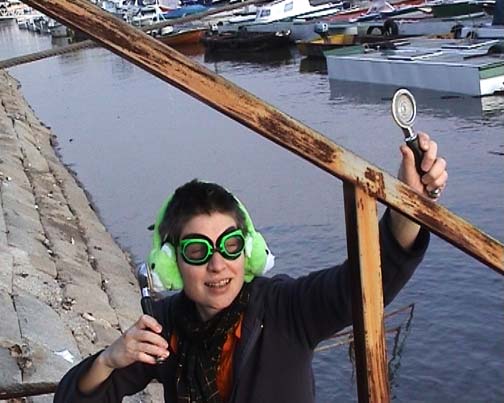http://www.modukit.com/3dsf3/sendi
Sendi is the idea of a quasi apparatus, with which we want to fullfill our wish to send and receive unexpected signals. With video we document the act of spontaneous finding and combining of things and the first constellation of Sendi. We call this sendipractice.
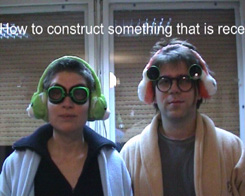
Although this practice refers to something like a mini scheme of communication (you need part A, part B, and a link), it happens in the dusty area underneath the determinated meanings of the common grounds.
Sendi practice does not accept that consensus and convention are the basis of communication. It conflicts with the technological motivated paradigm of transparence and standardisation. It is clownesque doubting in the info-imperativ of the free flow of communication which is liberated by technology.


For possible parts for the apparatus we find out two categories from two sources. One is Cvetko Market not far from our flat in Belgrad. There people sell things they have sorted out from the trash. These things have lost their meaning, they are rudimentary, their value is fictional and their price is symbolic.
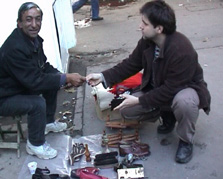
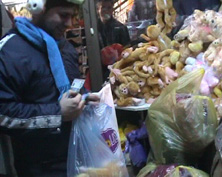
The second place we visit is the Chinese Market in New Belgrade. The goods which are sold there are like a cheap versions of dreams. Pseudoproducts, that only simulate or imitate standards. And because of that they seemed to be useful for us. Within the microcosmos-like and unvisible but strictly regulated world of the Chinese Market we initialize the Sendi.
The act of receiving and sending signals that are objectively not present is a reflection of the utopia that lies inside of communication techniques. And within the comical displacement of this act, within the autistic ignoring of the reference-system the last free act manifests itself but in the same time also the shattering of utopia.
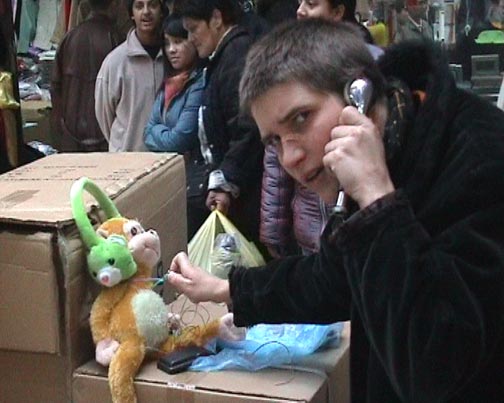
SENDI
Sendi ist so etwas wie ein Quasi-Apparat, mit dem wir uns den Wunsch erfüllen wollen, unerwartete Signale zu empfangen und zu senden. Mit Video dokumentieren wir das spontane Finden und Kombinieren von dem Vorhaben dienlichen Dingen und die erste Konstellation des Sendi. Das nennen wir Sendipraxis.

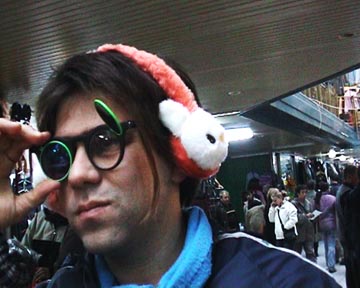
Diese Praxis orientiert sich zwar an einer Art Minischema von Kommunikation (man braucht Teil A, Teil B und eine Verbindung), werkelt aber im staubigen Bereich unterhalb der determinierten Bedeutungen des common grounds herum.
Sendipraxis akzeptiert nicht, daß Konsens und Konvention die Grundlage von Kommunikation ist. Sie findet sich im Widerspruch zum technologisch motivierten Paradigma der Transparenz und Standardisierung und ist ein clownesker Zweifel am Info-Imperativ des durch die Technologie befreiten Kommunikationsflusses.
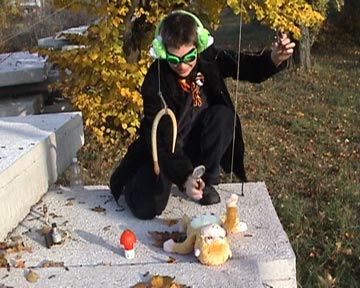
Für mögliche Teile des Apparates finden wir zwei Kategorien aus zwei Quellen. Eine ist der Cvetko Markt nicht weit von unserer Wohnung in Belgrad. Dort verkaufen Leute Gegenstände, die sie aus dem Müll gefischt haben. Diese Dinge haben ihre Bedeutung längst abgelegt, sie sind eher in rudimentärem Zustand, ihr Wert ist fiktional und ihr Preis symbolisch.
Der zweite Ort, den wir aufsuchen, ist der Chinesische Markt in Neu Belgrad. Die Waren, die dort verkauft werden, sind wie billige Versionen von Träumen. Wie Pseudoprodukte, die einen Standard nur simulieren oder imitieren, und aus diesem Grund erscheinen sie uns als geeignete Elemente für unser Experiment. In der mikrokosmosartigen und unsichtbar aber genau geregelten Welt des chinesischen Marktes initialisieren wir das Sendi.
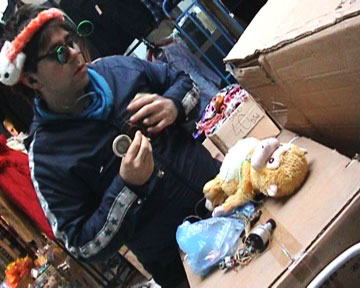
Im Akt des Sendens und Empfangens objektiv nicht vorhandener Signale spiegelt sich die Utopie, die in Kommunikationstechniken steckt. Und in der komischen Deplaziertheit der Handlung, im autistischen Ignorieren des Referenzsystems liegt gleichzeitig die letzte Freiheit des Handelns und das Zerbrechen der Utopie.
